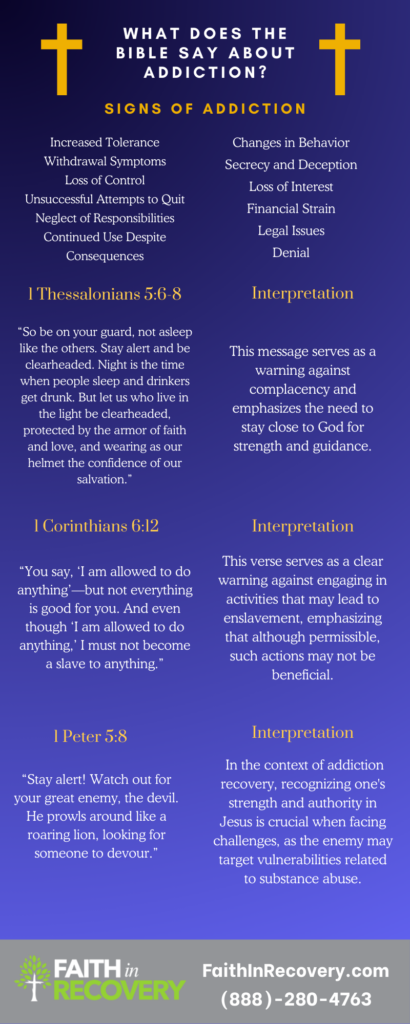
8 Things You Should Know About Detox
May 6, 2021
Benefits of Bible Studies for Addiction Recovery
May 27, 2021
8 Things You Should Know About Detox
May 6, 2021
Benefits of Bible Studies for Addiction Recovery
May 27, 2021
What the Bible Says About Addiction
Many people wonder if it’s okay to be an addict and a Christian.
For as long as substances of abuse have existed, people have fallen victim to addiction. The Bible is a source of history and wisdom regarding temptation, long-suffering, and giving in to sin. When going to the Bible for answers or guidance, it’s important to keep in mind that love is the foundation of the gospel and extends forgiveness and redemption by Jesus Christ. No matter which path you’ve taken in life, you can always find love, hope, and grace in Jesus. Our Christian drug rehab clarifies what the bible says about addiction and what that means for people who are suffering from this disease.
What is Addiction?
It’s always important to do your research when studying the Bible. Trying to find what the bible says about addiction requires you to first understand the disease itself. Addiction is a biopsychosocial disease characterized by the recurrent use of drugs or alcohol, or the repetitive participation in self-destructive behavior. The term “biopsychosocial” is the interconnection of biology, psychology, and socio-environmental factors. A person can also become addicted to other things like exercise, gambling, sex, technology, and more.
Some common symptoms of substance abuse include:
- Being unable to stop using drugs or alcohol on your own
- Having no control over your drug or alcohol use
- Feeling as if you have to use drugs or alcohol regularly
- Having intense urges or cravings for drugs or alcohol
- Taking large amounts of drugs or alcohol over a long period of time
- Maintaining a constant supply of drugs or alcohol
- Spending money on drugs and alcohol even if you can’t afford it
- Neglecting or failing to complete obligations at work or school
- Neglecting responsibilities at home
- Isolating yourself from your loved ones
- Spending time with people who also engage in substance abuse
- Doing things you wouldn’t normally do to obtain drugs or alcohol, like stealing
- Stealing or lying to loved ones to get drugs or alcohol
- Continuing to abuse drugs or alcohol despite repercussions
- Engaging in risky behavior under the influence of drugs or alcohol
- Experiencing withdrawal symptoms when you stop using drugs or alcohol
If you or a loved one is showing signs of addiction, get help immediately. Faith in Recovery offers different types of faith-based addiction treatment that can help people with alcoholism or drug addiction regain their sobriety.
What Does The Bible Say About Addiction?
 If you’re in addiction recovery, then you may rely on the Bible for guidance and reassurance in times of distress. If not, then you may wonder if Jesus and drug addiction can coexist. However, keep in mind that any mentions of addiction in the Bible are not limited to drugs and alcohol. The Bible addresses addiction in its rawest form, in which it’s considered a compulsive need for something. Below are 8 bible verses about addiction to drugs, alcohol, and anything else that enforces sin and turns people away from God.
If you’re in addiction recovery, then you may rely on the Bible for guidance and reassurance in times of distress. If not, then you may wonder if Jesus and drug addiction can coexist. However, keep in mind that any mentions of addiction in the Bible are not limited to drugs and alcohol. The Bible addresses addiction in its rawest form, in which it’s considered a compulsive need for something. Below are 8 bible verses about addiction to drugs, alcohol, and anything else that enforces sin and turns people away from God.
How Does the Bible Address the Issue of Drug Abuse and Addiction?
The Bible offers guidance on topics related to drug abuse and addiction through its teachings on sobriety, self-control, and the detrimental effects of harming our bodies. While the specific term "addiction" may not have been used in biblical times, the principles and lessons contained in its verses can still be applied to modern struggles with substance abuse.
The Bible does not explicitly address addiction as a disease, but it does caution against the dangers of excess, intoxication, and behaviors that lead to dependence. It underscores the importance of self-discipline and avoiding substances that can impair judgment and harm the body, emphasizing the need to remain sober-minded and vigilant against temptations that may lead to addiction.
Various scriptures can be interpreted to suggest that addiction is a sin, highlighting the spiritual and moral implications of substance abuse. At the same time, the Bible offers hope and encouragement, emphasizing that individuals can turn to God for strength and guidance in overcoming their struggles with addiction.
The overarching message from the Bible is often one of redemption, transformation, and the possibility of finding a way out of destructive patterns. Through reflection, study, and seeking guidance from spiritual leaders, individuals grappling with drug abuse and addiction can find solace and support in the teachings of the Bible.
1 Corinthians 10:13
“The temptations in your life are no different from what others experience. And God is faithful. He will not allow the temptation to be more than you can stand. When you are tempted, he will show you a way out so that you can endure.”
1 Corinthians 10:13 is a common piece of scripture used when discussing the Bible and addiction. Many of the best daily devotionals for recovering addicts mention this part of scripture. This Bible verse teaches that not only does God never give you more than what you can handle, but He also provides a solution or “a way out” whenever you are faced with a situation that may tempt you to sin. Although addiction is a disease that requires specific treatment, this verse is a reminder that God offers solutions for every situation, despite its severity.
1 John 2:16
“For the world offers only a craving for physical pleasure, a craving for everything we see, and pride in our achievements and possessions. These are not from the Father, but are from this world.”
Throughout the Bible as a whole, and especially in the New Testament, Jesus emphasizes the destruction caused by sin. Sin means to miss the mark, and this happens to everyone every day. In 1 John 2:16, John is speaking of the selfishness of sin and giving in to our cravings and desires despite the consequences. This verse is a warning against giving in to sinful desires of this world and instead focusing on what God wants for us.
1 Thessalonians 5:6-8
“So be on your guard, not asleep like the others. Stay alert and be clearheaded. Night is the time when people sleep and drinkers get drunk. But let us who live in the light be clearheaded, protected by the armor of faith and love, and wearing as our helmet the confidence of our salvation.”
In these verses, the Apostle Paul highlights the need to be awake, alert, and sober (clear-headed). This letter to the Thessalonians comes after they’ve accepted the truth of the gospel and the light of the world, which is Jesus. He compares light and dark and asleep and awake to urge them to stay alert and self-disciplined. He doesn’t want them to become complacent, uncaring, or idle in their belief or the application of their faith. The same concept applies to an individual in addiction recovery. It’s a warning to avoid complacency in your recovery and to stay alert against the challenges you’ll face. It’s also a reminder to stay close to God.
Ephesians 5:18-20
“Don’t be drunk with wine, because that will ruin your life. Instead, be filled with the Holy Spirit, singing psalms and hymns and spiritual songs among yourselves, and making music to the Lord in your hearts. And give thanks for everything to God the Father in the name of our Lord Jesus Christ.”
Ephesians 5:18-20 are more straightforward in their mention of drunkenness. Verse 18 jumps straight to the point and advises the people of the church in Ephesus to avoid being “drunk with wine” because it will ruin their lives. Alcohol has been drunk for centuries and used on various occasions. People from all walks of life have experienced its side effects, and many have also fallen victim to its dangers. Paul is advising the Ephesians to avoid alcohol and instead be filled with the Holy Spirit.
One of the many signs of alcoholism is the inability to control your drinking. If you believe that you or a loved one is developing an alcohol addiction or currently suffers from one, get help. We offer medically monitored detox at Faith in Recovery that helps patients wean off of substances like alcohol. This is a safe and efficient first step in recovery that individuals with alcoholism can benefit from.
Romans 5:3-5
“We can rejoice, too, when we run into problems and trials, for we know that they help us develop endurance. And endurance develops strength of character, and character strengthens our confident hope of salvation. And this hope will not lead to disappointment. For we know how dearly God loves us, because he has given us the Holy Spirit to fill our hearts with his love.”
Romans 5:3-5 is another set of well-known Bible verses that discusses the process of growing and learning from trials. These verses offer great encouragement to people in recovery from addiction. Many people wonder why they go through trials if God truly does love them, and these verses provide that answer. If we always give a child exactly what they want, will they ever learn any lessons? No, and that’s how God sees us. We’re His children, and He wants us to learn from our mistakes and learn to lean on Him as a result. Remember 1 Corinthians 10:13, He’ll never allow us to be tempted more than we can bear.
1 Peter 5:8
“Stay alert! Watch out for your great enemy, the devil. He prowls around like a roaring lion, looking for someone to devour.”
Even if you don’t believe there’s a specific embodiment of evil or evil being, evil itself does exist. 1 Peter 5:8 is a warning to stay on your guard against the schemes of evil, specifically the Devil. Evil is always looking for someone to devour. This can sound scary, but this actually tells us that we’re valuable in God’s sight. We’re loved by God, and therefore a threat to evil. This means we not only have the power to stay strong against evil, but we’re also a threat to the enemy’s schemes. The Devil will put challenges in your path that target your weaknesses. If you’re recovering from addiction or are sober, to begin with, the enemy may throw challenges in your path related to substance abuse. Remember the strength and authority you have in Jesus whenever you’re faced with a tough situation.
James 1:12-15
“God blesses those who patiently endure testing and temptation. Afterward they will receive the crown of life that God has promised to those who love him. And remember, when you are being tempted, do not say, ‘God is tempting me.’ God is never tempted to do wrong, and he never tempts anyone else. Temptation comes from our own desires, which entice us and drag us away. These desires give birth to sinful actions. And when sin is allowed to grow, it gives birth to death.”
James 1:12-15 also bounced off of 1 Corinthians 10:13. When we deny ourselves and instead seek out what He wants from us and what He wants us to do, He blesses us. God is constantly promising us that His path will never lead us astray. In James 1:12-15, we’re reminded that God never tempts us to sin, but rather we’re naturally tempted to sin and He wants us to stay alert. Our own desires can ensnare us, drag us away from God, and instead cause us to sin. And while God will always give us a way out when we are tempted to sin (1 Corinthians 10:13), He also wants to save us from this hardship in the first place.
1 Corinthians 6:12
“You say, ‘I am allowed to do anything’—but not everything is good for you. And even though ‘I am allowed to do anything,’ I must not become a slave to anything.”
1 Corinthians 6:12 is is one of the most common bible verses about drug addiction, alcoholism, and anything else that “enslaves” us. This verse is very clear and straightforward, explicitly saying that while we can do certain things, it doesn’t mean they’re good for us. And while we’re allowed to do certain things, these things can also enslave us. It’s easy to become entrapped in temptation and sin, trading our freedom for chains. Through the many people who are mentioned in the Bible and wrote it, God is constantly giving us advice so we can avoid these hardships. Sin births death and one selfish or careless act can eventually lead to a life of disease and hardship.
What are some lessons about addiction and recovery that can be learned from the Bible?
The Bible offers several teachings on the subject of addiction and recovery, providing insight and guidance for those seeking a way out of their struggles. Here are some pivotal lessons drawn from the scriptures:
1. Shared Human Experience: The Bible acknowledges that temptations are a universal human experience, ensuring believers that they are not facing their struggles alone. It emphasizes that every challenge comes with the divine promise of a way to overcome it, suggesting resilience and divine support in times of need.
2. Freedom of Choice: It teaches that individuals have the agency to choose their paths. This choice extends to habits and dependencies, where one can either choose a path leading to destruction or one that aligns with divine principles promoting life and righteousness.
3. Courage over Fear: Scripture encourages believers to replace fear with the power of love and self-discipline. This reassurance helps individuals facing addiction to embrace recovery with confidence and embrace the strengths granted to them by their faith.
4. Importance of Supportive Relationships: The texts highlight the importance of companionship and mutual support. It is easier to face and overcome life’s hurdles when there is someone to help lift you up when you fall, illustrating the value of a supportive community in the journey to recovery.
5. Associations Affect Character: The Bible warns against keeping the company of those who might lead one away from desirable behaviors. Surrounding oneself with a positive and supportive community is depicted as crucial to maintaining good character, particularly during recovery.
6. Grace and Redemption: Lastly, the scriptures emphasize that forgiveness is a gift always available, even in moments of weakness. The concept of grace is central, suggesting that one's imperfections can become testimonies of strength and renewal through faith.
These teachings collectively provide a framework not just for confronting addiction, but for recovering in a way that reinforces one's faith and personal growth.
What Is Faith In Recovery And How Can It Help Individuals Struggling With Addiction?
Faith In Recovery is a widely recognized support program designed to assist individuals grappling with addictions, mental health concerns, and other behavior issues. This program uniquely blends traditional 12-step recovery principles, commonly seen in Alcoholics Anonymous and Narcotics Anonymous, with biblical scripture to solidify the steps' themes. For instance, the acknowledgment of personal powerlessness over addictions and compulsions finds a spiritual echo in a Bible verse from Romans 7:18, highlighting the internal conflict and inability to do good despite the desire. By incorporating these spiritual reinforcements, Faith In Recovery offers a holistic approach to overcoming personal struggles.

